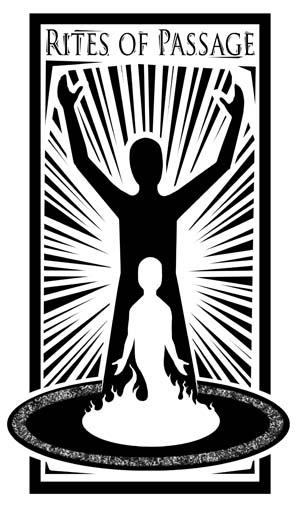Indigenous People's Wisdom on Rites of Passage
 Saturday, October 5, 2013 at 5:30PM
Saturday, October 5, 2013 at 5:30PM From Kissed by a Fox, Priscilla Stuckey:
Malidoma wrote (from The Healing Wisdom of Africa; paraphrased by Priscilla Stuckey): Rites of initiation in nature were especially important, for nature is the source of knowing; to know your own destiny, your gifts and purpose in life, you must first grapple with nature’s mysteries, and only by forging your own relationship with nature can you remember why you are here and develop the power to release your gifts into the world. (pg. 47)
Sobonfu and Malidoma in a training that Priscilla Stuckey attended, said:
“We all forget our purpose, for we go through the rigors of being born, then living as infants and toddlers. As we grow we need to discover our gifts anew. The community exists to help individuals remember their purpose.” (Priscilla paraphrasing) A community pays special attention to each individual, nourishing each one with the quality of attention that helps each bring forth her deepest gifts … because the adults know that every child will make a difference – not in an abstract way, but for them, for the world they will make together as the child grows. “This person brings me-us a priceless gift.” (pg. 108-09)
An Andean native: “Conversation is thus an attitude, a mode of being in unison with life, a knowing how to listen and knowing how to say things at the appropriate moment.” (pg. 134)
John Muir: “On no subject are our ideas more warped and pitiable than on death. Instead of the sympathy, the friendly union, of life and death so apparent in nature, we are taught that death is an accident, a deplorable punishment for the oldest sin, the arch-enemy of life.” (pg. 243)
Australian aboriginal Yarralin man, Pulkara: The land had been made “wild” not by letting it be but by trampling it, not by the absence of humans but by their irresponsible presence. “Wild” land was land that would wash away in the next rain. “Quiet” land, by contrast, was land well cared for, loved and nurtured throughout the generations. (pg. 308)
Doug Campbell, senior Yarralin aboriginal man: The law they live by, say the Aboriginal people, resides in the land itself; it was not made by humans. In this way it is different from the law of the Europeans. “Whitefellow law goes this way, that way, all the time changing. Blackfellow Law different. It never changes. Blackfellow Law hard – like a stone, like that hill. The Law is in the ground.” (pg. 309)










Reader Comments